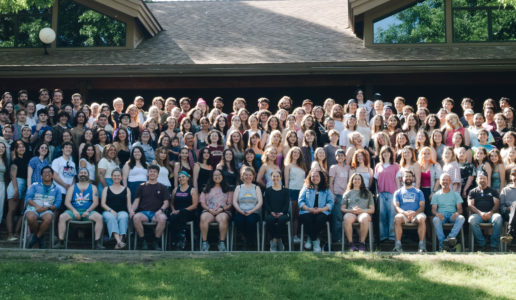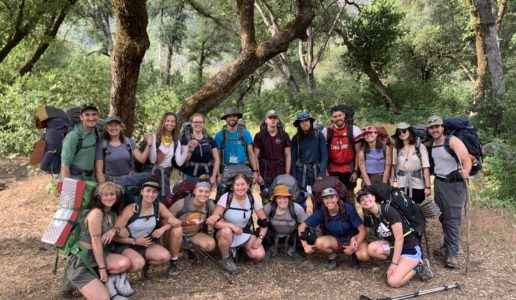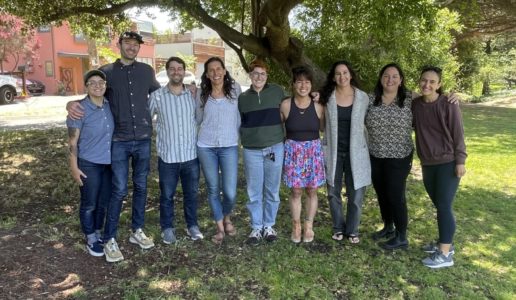The Secret Sauce Behind Family Camp
By: Jamie Simon
In honor of Spring Family Camp kicking off Tawonga’s 2019 season today, here’s a piece on the beauty of family camp weekends – enjoy!
Daily life was feeling hectic and stressful for Tanya, a working mom living in the Bay Area with her two daughters and husband. She had little time to reflect or unwind and even less to build Jewish community. Tanya didn’t think family camp was within reach financially, but with some assistance, she and her family have attended Camp Tawonga (just outside of Yosemite National Park) for the past two summers and shared transformative experiences together.
“Family Camp is a time of joy, relaxation and celebration with my family,” Tanya shared. “We spend quality time together away from the hustle of our daily lives. And we’re able to be in a loving, nurturing, adventurous environment of Jewish families reinforcing Jewish values. By connecting with new and longtime friends, we are growing and strengthening our community.”
I hear emotional reflections like Tanya’s all the time about the benefits of family camp, from all different kinds of families. It led me to distill down what exactly is the secret sauce behind these weekends that make them so impactful. I came up with three key ingredients (more can be added to spice things up), but below are the essentials – enjoy!
1. Accessibility
It can be hard to carve out time for Jewish experiences during our busy lives. Family camp is an accessible, low-commitment way to spark (or re-ignite) Jewish life for many people. At a fraction of the cost of a full summer camp session (plus financial assistance available) and only one weekend out of the year, there is a low barrier to participate, and it’s is an easy and wonderful first step to building Jewish community.
Each summer, close to 1,200 people like Tanya come to Family Camps at Tawonga for many different reasons: to destress, reconnect with their kids or spouses, unplug and connect to nature, reunite with old friends, the list goes on. Regardless of the reason, families come away from camp with powerful, meaningful and memorable experiences.
2. Building Intentional Community
Humans crave close-knit community in our screen-filled, deadline-driven society, whether they are aware of it or not. Summer camps are in the business of building community. At Tawonga, we take a group of people, and by the end of their experience, they have laughed, cried, felt at one with the outdoors and are basically bonded for life.
It’s all by intentional design. Throughout a four-day weekend, families are encouraged to share meaningful interactions together at every turn. It’s in the way we kick off Shabbat services and have each person “give a hug to somebody next to you.” It’s through a meticulously honed schedule that offers the right amount of scheduled time, balanced with ample down time so families can take those facilitated exchanges and continue them in more organic ways.
Plus, mornings at family camp include childcare (including babies and toddlers), so kids and adults can bond within their own peer groups while exploring their own activities. Many participants leave closer with existing friends, and with new friends in tow.
(Bonus: After the weekend is over, families can keep engaging with their Jewish community all year long through weekend-specific Facebook groups as well as local family-friendly “Down the Mountain” events on Sukkot, Passover, Erev Rosh Hashanah and Purim plus several Tot Shabbats for the littlest ones.)
3. Inclusion: Lowering the Barrier to Jewish Experiences
Some families have their very first Jewish experience at family camp. Others keep Jewish homes and are highly observant, and many are interfaith or fall somewhere in between. No matter where one falls on the spectrum of Jewish observance, everyone at family camp feels welcome and included to have meaningful Jewish experiences.
At family camp, we have something for everyone: Jewish nature walks, freilach (dancing after our Shabbat meal), a Torah service in the woods, Havdalah under the stars, the list goes on. Those who don’t know the Hebrew blessings during services or before and after meals are encouraged to hum along or read the transliteration provided – no judgement.
We believe that people identify most Jewishly when they have a say in creating their Jewish experience. Oftentimes, participants at family camp are actively involved in establishing their Jewish practices and rituals so that they resonate personally. Time and time again, I hear people come away from family camp feeling more connected to their Jewish identities with a desire to continue the traditions back home.
A Simple Recipe
So, the recipe is simple: make family camp accessible, build intentional community and help all to feel included Jewishly. What we’re observing at Camp Tawonga is that this special sauce allows families to unplug together in nature; share new, bonding experiences; create lasting memories and strengthen their Jewish community.
I ran into a friend recently who brought his family to Family Camp for the very first time last fall. When I asked him how it went, he lit up: “The word ‘magical’ comes to mind. I left Tawonga simply in awe, connected to community, my Jewish identity and my family in a way I never had before. It was the best time we’ve had with our kids since becoming a family.”
Just a few days in the woods can change everything.
It’s not too late to join a Tawonga Family Camp in 2019 – some spots still remain in our Keshet LGBTQ Family Camp Weekend (Aug 22-25) and our Fall I Weekend (Sep 5 to 8).
Jamie Simon is Camp Tawonga’s Executive Director and has worked for the agency for over 16 years in various capacities including camp director for nine years. An expert in emergency preparedness as well as gender inclusion and teen health education, Jamie speaks at conferences and leads workshops nationally on these issues. In her role as camp director, she participated in the Foundation for Jewish Camp’s Executive Leadership Institute and in the Bureau of Jewish Education’s Shofar Fellowship.
The Jewish Federations of North America previously published this article as part of their “Ideas in Jewish Education and Engagement” series.




